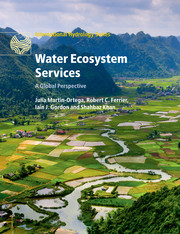Book contents
- Frontmatter
- Contents
- List of contributors
- Preface
- 1 Introduction
- 2 What defines ecosystem services-based approaches?
- Part I Addressing global challenges
- Part II Applying frameworks for water management and biodiversity conservation under an ecosystem services-based approach
- Part III Assessing water ecosystem services
- Part IV Broadening the perspective
- 15 Ecosystem services-based approaches to water management: what opportunities and challenges for business?
- 16 Key factors for successful application of ecosystem services-based approaches to water resources management: the role of stakeholder participation
- 17 Cultural ecosystem services, water, and aquatic environments
- 18 The psychological dimension of water ecosystem services
- 19 The interface between human rights and ecosystem services
- 20 Water ecosystem services: moving forward
- Index
- Plate Section
- References
19 - The interface between human rights and ecosystem services
from Part IV - Broadening the perspective
Published online by Cambridge University Press: 05 May 2015
- Frontmatter
- Contents
- List of contributors
- Preface
- 1 Introduction
- 2 What defines ecosystem services-based approaches?
- Part I Addressing global challenges
- Part II Applying frameworks for water management and biodiversity conservation under an ecosystem services-based approach
- Part III Assessing water ecosystem services
- Part IV Broadening the perspective
- 15 Ecosystem services-based approaches to water management: what opportunities and challenges for business?
- 16 Key factors for successful application of ecosystem services-based approaches to water resources management: the role of stakeholder participation
- 17 Cultural ecosystem services, water, and aquatic environments
- 18 The psychological dimension of water ecosystem services
- 19 The interface between human rights and ecosystem services
- 20 Water ecosystem services: moving forward
- Index
- Plate Section
- References
Summary
19.1 INTRODUCTION
Ecosystem services and human rights are usually discussed separately. The development of theory and practice in the field of ecosystem services has generally been the domain of ecologists, economists, and policy makers; lawyers have also engaged in the dialogue and development, but to a lesser extent (Mertens et al. 2012, p.31). The purpose of this chapter is to play a part in the development of a deepening dialogue between ecologists, economists, and lawyers by discussing the integral links between ecosystem services and human rights. It draws from references relating to water ecosystem services and the use of human rights to protect them, but these examples provide an illustration of a wider relationship that exists between human rights and ecosystem services generally.
The chapter is divided into two main sections. The first section considers the conceptual and practical relationships between ecosystem services and human rights. It therefore considers the human rights that can be impacted through the loss of ecosystem services and also the practical relationships between certain rights and ecosystem services. The requirement of brevity does not allow an exhaustive examination of all of the human rights that are affected, but those that are selected represent some of the core issues. Therefore, it includes the rights to life, health, water, food, and property. In addition, it considers the role of procedural environmental rights in enabling citizens to become involved in decision-making processes related to the environment and also the role of those rights designed to set specific environmental standards (substantive environmental rights). The crucial role that work within the United Nations has had in developing the understanding of the links between human rights, the environment, and ecosystem services is integrated within the discussion.
The second section discusses possible ways that human rights can be further developed to operationalize ecosystem services-based approaches.
- Type
- Chapter
- Information
- Water Ecosystem ServicesA Global Perspective, pp. 163 - 169Publisher: Cambridge University PressPrint publication year: 2015

